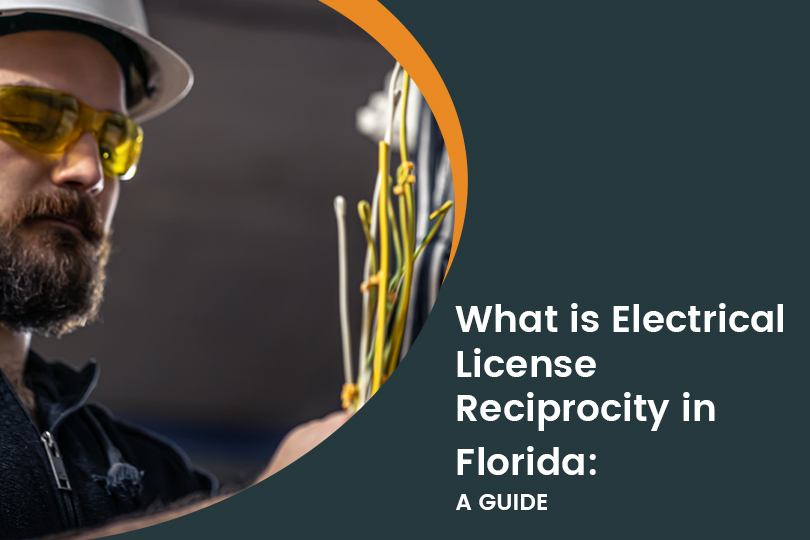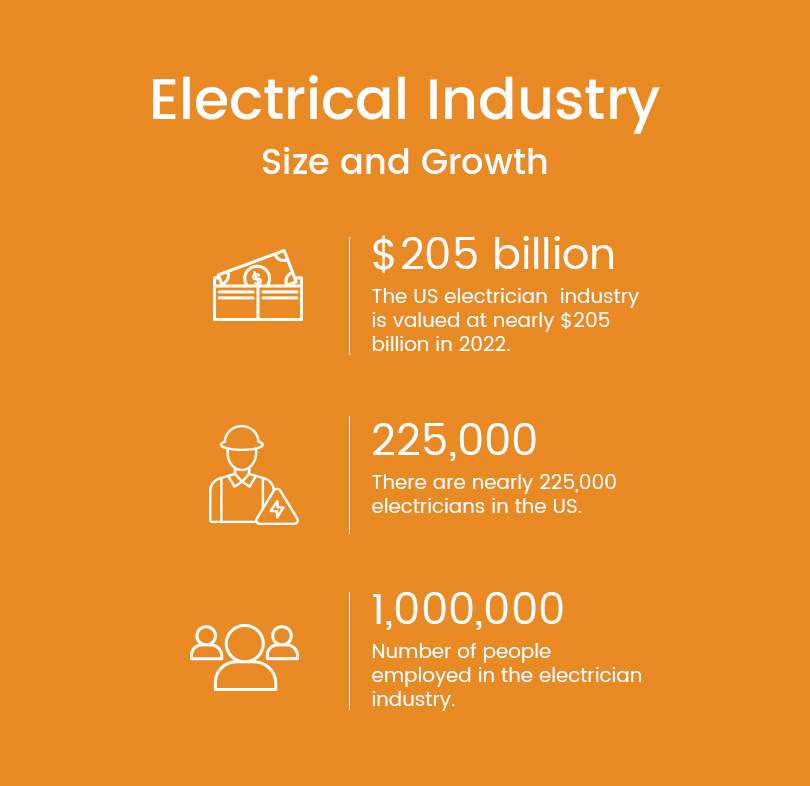

Electricity powers our world, and the skilled professionals responsible for installing, repairing, and maintaining electrical systems are known as electrical contractors. Becoming a licensed electrical contractor is a rigorous process, but what happens when these professionals need to work in different states? That’s where electrical license reciprocity comes into play.
Boost Your Towing Business with Field Promax Towing Company Software. Experience our demo to unlock 14-day free trial!
In this blog, we’ll explore the concept of electrical license reciprocity in the United States. We’ll delve into the specifics of Florida’s electrical contractor license requirements and list out Florida’s reciprocity agreements with various states. We’ll also highlight the consequences of performing electrical work without a valid license. So, whether you’re an experienced electrical contractor or considering this career path, read on to understand how electrical license reciprocity affects you.
Table of Contents
Electrical contractors are responsible for ensuring that electrical systems in residential, commercial, and industrial settings operate safely and efficiently. To become a licensed electrical contractor in the United States, individuals must typically meet specific educational, training, and examination requirements. These requirements are established at the state level, and they may vary significantly from one state to another.
In this blog, we will focus on the state of Florida as an example to highlight the general requirements for an electrical contractor license. Please note that the requirements and regulations in Florida may differ from those in your state.
The US electrical contractor industry is valued at $205 billion in 2022 and is expected to reach $284 billion by 2028 at a CAGR of 3.94%.

Among all the states, Florida is a great place to start or expand an electrical contractor business. The average hourly pay for an electrical contractor in Florida is $28.80. The average annual income for electrical contractor business owners in the U.S. is approximately $96,580.
However, to work in Florida, you must have an electrical contractor license. And to pursue licensure, you need to fulfill certain requirements.
The process of obtaining an electrical contractor license in Florida is stringent and requires candidates to meet specific criteria. The following are the typical Florida electrical contractor license requirements:
Florida usually requires candidates to have a certain number of years of experience working as an electrician under the supervision of a licensed electrical contractor. The specific number of years may vary depending on the type of license sought.
Candidates must pass the required electrical contractor’s examination, which assesses their knowledge of the National Electrical Code (NEC) and the Florida Building Code.
Electrical contractors in Florida are often required to carry liability insurance and be bonded. This is a crucial step to protect both the contractor and the clients.
There are various fees associated with the application process, including an initial application fee, an examination fee, and a license fee upon approval.
Applicants are required to submit documentation proving their work experience, as well as their examination results and proof of insurance.
Florida typically conducts a background check on all applicants to ensure they have a clean criminal record.
Licensed electrical contractors in Florida must complete continuing education requirements to stay updated on the latest industry developments and code changes.
Now, let’s find out the different types of electrical contractor license Florida offers.
If you have fulfilled the stipulated requirements, you can have one of the four types of electrical contractor licenses in Florida. This includes:
Now, let’s explore the concept of electrical license reciprocity and how it affects electrical contractors working across state lines.
Electrical license reciprocity is an agreement that allows licensed electrical contractors in one state to have their license recognized and accepted in another state without having to go through the entire licensing process again. This system promotes mobility for electrical contractors, simplifying the process of working in different states. However, it’s important to understand that reciprocity agreements can vary significantly from one state to another.
Electrical license reciprocity allows electricians to work across state lines without the need to undergo the complete licensing process in a new state. This promotes professional mobility, giving licensed electricians the flexibility to take on projects in different geographic regions.
Reciprocity makes it easier for electrical contractors and skilled electricians to respond to demand fluctuations and job opportunities in different areas. This, in turn, contributes to workforce flexibility and can help address regional shortages of skilled electricians.
Reciprocity supports economic growth by encouraging the movement of qualified electricians to areas where their skills are needed most. This can help facilitate construction and infrastructure development projects, which, in turn, stimulate local economies.
Boost Your Towing Business with Field Promax Towing Company Software. Experience our demo to unlock 14-day free trial!
While promoting mobility, electrical license reciprocity also ensures that the receiving state recognizes the qualifications and competency of the licensed electrician. This safeguards consumers, as they can have confidence that the electrician they hire meets certain professional standards.
Reciprocity reduces the administrative burden on electricians. It eliminates the need for duplicating the licensing process, taking exams, and paying additional fees when they move to another state.
Reciprocity encourages electricians to invest in their professional development and maintain their licenses. The knowledge and skills required to obtain and keep a license align with best practices in the electrical industry.
States that participate in reciprocity often have similar or equivalent licensing requirements, which ensures a consistent level of quality and safety in electrical work. This consistency benefits consumers and the industry.
Electricians who move between states can bring their knowledge and innovative practices from one area to another, potentially improving processes and techniques in the electrical field.
Reciprocity helps reduce the occurrence of unlicensed or underground electrical work, as it provides a legitimate pathway for licensed professionals to work in new jurisdictions.
States participating in reciprocity are more likely to adopt or align with national electrical code standards. This promotes consistency and reduces confusion among electricians and consumers.

Until very recently, Florida did not have any license reciprocity agreements with other states. As of June 1, 2021, licensed electrical contractors from certain states can now enter into a reciprocity agreement with the Florida Construction Licensing Board and apply for reciprocity. This allows them to work and run businesses in the state of Florida with their existing electrical contractor license.
The states that have reciprocity agreements with Florida include:
On the other hand, if you have a Florida electrical contractor license, you can work via reciprocity agreement in the following states:
To avail of reciprocity in Florida, an electrical contractor must fulfill the following requirements:
Please note that reciprocity agreements can change, and states may modify their requirements over time. Therefore, it’s essential to verify the current reciprocity agreements and conditions with the respective state’s electrical licensing board or authority.
It’s crucial for both clients and contractors to ensure that any electrical work is performed by a licensed and qualified professional. Clients should verify a contractor’s license before hiring them, and contractors must adhere to state and local regulations to maintain their licenses.
Final WordsPerforming electrical work without a valid license is not only illegal but also poses significant risks to both contractors and clients. It’s essential to follow state and local regulations, maintain licensure, and ensure that electrical work is carried out by qualified professionals to guarantee safety and quality in the electrical industry.
To this end, Field Promax can be your biggest advantage.
Essentially an electrical contractor business software system, Field Promax is a powerful tool that simplifies the complex process of delivering quality service for electricians. With its user-friendly interface and robust features, Field Promax streamlines the workflow and thus adds efficiency, transparency, and scalability to the business process, making it more productive and profitable.
In addition to enhancing business performance, Field Promax can also help you with the critical aspects of the application and verification processes required to avail of electrical license reciprocity. It allows electrical contractors to organize valuable information, like employee licensing information, qualifications, and work experience, ensuring that they meet the requirements for reciprocity in their chosen state.
Field Promax’s intelligent system cross-references this data with the specific reciprocity agreements and conditions, making sure that everything aligns perfectly. It not only saves electricians time and effort but also minimizes the chances of errors or omissions that can delay the reciprocity process.
In a field where precision and compliance are paramount, Field Promax is an invaluable tool that makes electrical license reciprocity a smoother, more efficient process for licensed professionals seeking to work across state lines.